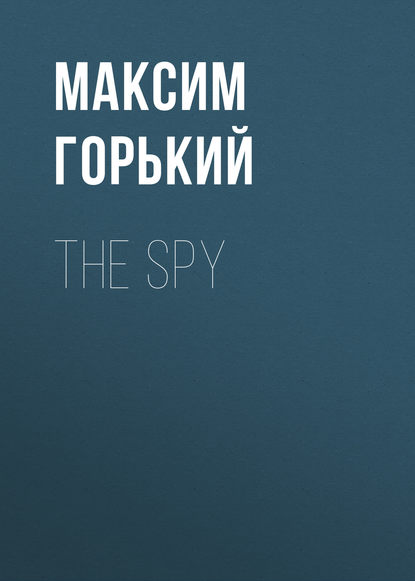По всем вопросам обращайтесь на: info@litportal.ru
(©) 2003-2024.
✖
The Spy
Настройки чтения
Размер шрифта
Высота строк
Поля
"Sit down."
Klimkov seated himself, keeping his head bowed. The sound of the tearing of the wrapping made him start. Without raising his head, he looked at the writer warily from under lowered lids. Mironov stood before him regarding the package, his mustache quivering.
"You say he's gone off?"
"Yes."
"And you yourself are also an agent?"
"Yes," said Yevsey quietly, and thought, "Now, he'll scold me."
"Your face seems familiar to me."
Yevsey tried not to look at him. But he felt the writer was smiling.
"Yes, I suppose it is familiar to you," said Yevsey sighing.
"Have you, too, been tracking me?"
"Once. You saw me from the window. You came out into the street, and gave me a letter."
"Yes, yes. I remember. The devil! So that was you? Well, excuse me, my dear man. I think I must have offended you, eh?"
Yevsey rose from the chair, looked into his laughing face incredulously, and glanced around.
"That's nothing," he said.
He felt unbearably awkward as he listened to the somewhat rude yet kindly voice. He was afraid that after all the writer would abuse him and drive him out.
"There, you see how strangely we meet this time, eh?"
"Nothing else?" asked Yevsey confused.
"Nothing else. But I believe you are tired. Sit down. Rest."
"I must be going."
"Very well. As you please. Well, thank you. Good-by."
He extended his large hand with reddish wool on the fingers. Yevsey touched it cautiously.
"Permit me also to tell you my life," he requested unexpectedly to himself. The instant he had distinctly uttered these words, he thought, "This is the very man to whom I ought to speak, if Timofey Vasilyevich himself, such a wise person and better than everybody, respects him." Recalling Maklakov, Yevsey looked at the window, and for a moment grew anxious.
"No matter," he said to himself. "It's not the first time he's had to freeze."
"Well, why not? Tell me, if you want to. Won't you take off your overcoat? And perhaps you will have a glass of tea. It's cold."
Yevsey wanted to smile, but he restrained himself. In a few minutes, his eyes half closed, he told the writer monotonously and minutely about the village, about Yakov, and about the blacksmith. He spoke in the same voice in which he reported his observations in the Department of Safety.
The writer, whom Yevsey observed from under his lashes, was sitting on a broad, heavy taborette, his elbows on the table, over which he bent, twirling his mustache with a quick movement of his fingers. His eyes gazed sharply and seriously into the distance above Klimkov's head.
"He doesn't hear me," thought Yevsey, and raised his voice a little, continuing to examine the room without himself being observed, and jealously watching the face of the author.
The room was dark and gloomy. The shelves crammed with books, which increased the thickness of the walls, apparently kept out the sounds of the street. Between the shelves the glass of the windows glistened dully, pasted over with the cold darkness of the night, and the white narrow stain of the door obtruded itself on the eye. In the middle of the room was a table, whose covering of grey cloth seemed to lend a dark grey tone to everything around it.
Yevsey was ensconced in a corner of a chair covered with a smooth skin. For some reason he propped his head hard against its high back, then slid down a little. The flames of the candles disturbed him; the yellow tongues slowly inclining toward each other, seemed to be holding a conversation. They trembled, and straightened themselves out, struggling upward. Back of the author over the sofa, hung a large portrait, from which a yellow face with a sharp little beard looked out sternly.
The author began to twirl his mustache more slowly, but his look as before travelled beyond the confines of the room. All this disturbed Yevsey, breaking the thread of his recollections. He be-thought himself of closing his eyes. When he did so, and darkness closely enveloped him, he sighed lightly. Suddenly he beheld himself divided in two – the man who had lived, and the other being who was able to tell about the first as about a stranger. His speech flowed on more easily, his voice grew stronger, and the events of his life drew themselves connectedly one after the other, unrolling easily like a ball of grey thread. They freed the little feeble soul from the dirty and cumbersome rags of its experiences. It was pleasant to Yevsey to tell about himself. He listened to his own voice with quiet astonishment. He spoke truthfully, and clearly saw that he had not been guilty of anything, for he had lived all his days not as he had wanted to, but as he had been compelled to do; and he had been compelled to do what was unpleasant and unnecessary to him. Filled with a sense of sincere self-pity, he was almost ready to weep and to fall in love with himself.
Whenever the author asked him a question, which Yevsey did not understand, he would say without opening his eyes, sternly and quietly:
"Wait, I'm telling it in order."
He spoke without wearying, but when he came to the moment of his meeting with Maklakov, he suddenly stopped as before a pit. He opened his eyes, and saw at the window the dull look of the autumn morning, the cold grey depth of the sky. Heaving a deep sigh, he straightened himself up. He felt washed within, unusually light, unpleasantly empty. His heart was ready submissively to receive new orders, fresh violence.
The author rose noisily from his seat, tall and strong. He pressed his hands together, cracking his fingers disagreeably.
"What do you think of doing now?" he asked, as he turned to the window without looking at Klimkov.
Yevsey also rose, and repeated with assurance what he had told Maklakov.
"As soon as the new life is arranged, I'll quietly go into some business – I'll go to another city – I've saved about one hundred and fifty rubles."
The author turned to him slowly.
"So?" he said. "You have no other desire whatsoever?"
Klimkov thought, and answered:
"No."
"And you believe in the new life? You think it will arrange itself?"
"Of course. How else? If all the people want it. Why won't it arrange itself?"
"I'm not saying anything."
Mironov keeping silent turned to the window again, and straightened out his mustache with both hands. Yevsey stood motionless, awaiting something and listening to the emptiness in his breast.
"Tell me," said the writer softly and slowly, "aren't you sorry for those people, that girl, your cousin, and his comrade?"
Klimkov bowed his head, and drew the skirts of his coat together.
"You found out that they were right, didn't you?"
"At first I was sorry for them. I must have been ashamed, I suppose. But now I'm not sorry any more."
"No? Why not?"

















